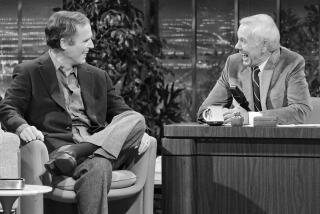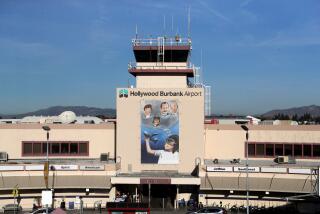Burdale? Glenbank?
- Share via
The two cities are home to the largest concentration of entertainment companies in the world.
One began as a blue-collar town that produced military aircraft for World War II and the Cold War before blossoming into a global media center. The other was built on white-collar industries and retail stores before joining the entertainment boom.
Sharing common economic interests and a common border, Burbank and Glendale would seem likely to form the perfect symbiotic union. But officials of both cities say that despite their common bonds, they are lively competitors.
“It’s the municipal equivalent of sibling rivalry. We are always trying to one-up the other,” said Burbank Councilman Ted McConkey. “Frequently it’s positive, but sometimes it degenerates into negative competition that doesn’t serve the interest of either city.”
A prime example is the long-running feud over plans to build a new 19-gate terminal at Burbank Airport. Glendale favors it and Burbank is opposed. The cities also have competed over the past decade for retail businesses and the taxes they bring in.
“We’ve always had a friendly, anything-you-can-do-we-can-do-better relationship,” said Glendale Councilwoman Ginger Bremberg, who caused a stir in the mid-1980s by saying that Burbank should be “paved over into a parking lot for the Glendale Galleria.”
But Burbank also has gotten its lumps in. In 1995, Burbank residents organized a Christmas shopping boycott of Glendale businesses, part of the long-running dispute over the airport.
“You don’t give us what we want on the airport, we won’t support your retail business,” said one official of the ill-fated effort.
Charles Lombardo, now a Burbank appointee to the Burbank-Glendale-Pasadena Airport Authority, described the boycott as an effort to get Glendale’s attention. Each of the three cities appoints three members of the commission that runs the airport, giving the other two cities the power to outvote Burbank.
“My purpose was to send a message to Glendale that we don’t have a say in who you appoint to the airport commission, but we can influence things by where we shop,” Lombardo said.
“Now, I’m on the commission and working on a solution to get beyond the impasse.”
Despite occasionally heated rhetoric, officials from Burbank and Glendale acknowledge their cities are very much joined at the hip.
That cooperation is evident in the way the cities work together, jointly operating sewer inspections, swift-water rescue training for firefighters and police officers and sharing emergency resources such as fire equipment and helicopters. Burbank maintains both cities’ traffic signals while Glendale maintains radio transmitters for the cities’ police departments.
The two municipalities also have teamed with Pasadena to operate the Verdugo Communications Center, which provides emergency dispatch for all three fire departments. The two cities also joined recently to run a fire academy that graduated its first combined class this year.
Officials from both cities said the academy operates smoothly and without controversy, unlike the acrimonious joint-powers agreement between the same three cities governing Burbank Airport.
When it comes to their economies, the cities also seem acutely aware that it profits them both to add to their core industries by bringing in entertainment and multimedia concerns.
“If we can’t find a home for them, if we can’t meet their needs, we’ll do everything we can to locate them in Glendale,” said Burbank City Manager Bud Ovrom. “Our real competition is Playa Vista, Santa Monica, Culver City and people out of state in Arizona, Oregon and Washington. We have more in common to protect working together.”
Movies, television, video games and other multimedia offerings, said Ovrom, is where the real long-term prosperity lies--”not who get the latest Wal-Mart.”
Traditionally, entertainment companies have gravitated to Burbank, which in the last two decades has transformed itself into what is arguably the world capital of the industry--the real Hollywood.
Disney, Warner Bros., NBC and Nickelodeon among others have established themselves in a city that formerly relied on Lockheed and its associated aerospace industry, fueled by federal defense dollars.
Glendale, long home to large national and multinational corporations, has broadened its historically stable economy by adding entertainment companies to its tax rolls, hoping to cash in on its proximity and similarity to Burbank.
DreamWorks, Warner Bros. and Disney have expanded their operations into Glendale. Disney subsidiary KABC-TV is planning to relocate from Los Angeles to Glendale by the year 2000.
“Entertainment has traditionally been Burbank’s,” said Bremberg. “It’s only quite recently that we’ve gotten into it.”
Though officials in both cities speak amicably about their entertainment industry ties, when the subject turns to retail businesses, moods darken.
The retail industry is a zero sum game--meaning that if one shopping area makes more money, it typically comes at the expense of another shopping area, said Cindy Chong, general manager of the Glendale Galleria, which is five miles east of Burbank’s Media City Center.
For a time, it seemed that Burbank conceded the retailing business to Glendale. In the 1960s and ‘70s, Ovrom said, the city’s media center district, which was closed to traffic, had 30% to 40% vacancy rates and no major retailers.
“It was literally a ghost town,” he said.
But around 1985 the city got serious about trying to revitalize the area, amending its municipal codes to allow new businesses to move in without adding parking while the city built parking structures. Business also got a boost when the city opened a 10-screen AMC movie theater that immediately began to draw 2 million people a year. That was followed by more retail stores and a more competitive spirit between the cities.
“It’s a friendly competition,” said Daniel Millman, general manager of the Media City Center. “We don’t wish bad on each other and we want to do the best for our own interest.”
But the cities’ leaders are also known to gloat when the opportunity arises. When Burbank landed a deal with Galpin Ford owner Bert Boeckmann for a new mega-dealership, Burbank officials said Glendale’s auto sales center simply could not offer what the next generation of dealerships needs: land overlooking a busy freeway.
It wasn’t always so, the competition and the cooperation between the two cities. Before roughly 20 years ago, the cities rarely even interacted.
“There was no real contact,” said Bill Dotson, 72, a lifelong Glendale resident, retired fireman and former member of the city’s Historic Preservation Committee. “It’s only in the last few years, couple of decades maybe, where they’ve come together to share resources and compete for resources.”
Dotson, who graduated from Hoover High School in the 1940s, recalled his basketball-playing days, when Hoover met Burbank High School regularly on the court.
“It was just another team in another city,” he said. “There was no special rivalry. Basically, the two cities didn’t pay special attention to each other. But recently, that’s changed. Now there’s cooperation and a new kind of competition.”
Nonetheless, officials on both sides of the border speak proudly of their relationships today; Glendale City Manager Jim Starbird and Ovrom have been personal friends since they worked together in the Monrovia city manger’s office in the 1970s.
Ovrom, who has served as Burbank city manager since 1985, said at the beginning of his tenure that the city managers of Burbank, Glendale and Pasadena would meet regularly, usually every month over lunch.
“We were always looking for ways to do things together,” Ovrom said. “We also encouraged all of our department heads to get together on a regular basis. The most active were police, fire, public works and utilities.”
The final word goes to the residents, some of whom are coming to see the cities as one large entity, so similar in so many ways as to be virtually indistinguishable.
“I think the two cities are pretty much identical,” said Hiuro Mardirossian, 20, of Glendale. “It’s one big city to me.”
Those sentiments are not limited to residents.
“When we think about Glendale and Burbank, we think about them as a region,” said Disney Vice President George Garfield. “So combining the two has been a very positive way with which to grow, from our perspective.”
*
Blankstein is a Times staff writer and Steinman a special correspondent.
More to Read
Inside the business of entertainment
The Wide Shot brings you news, analysis and insights on everything from streaming wars to production — and what it all means for the future.
You may occasionally receive promotional content from the Los Angeles Times.










